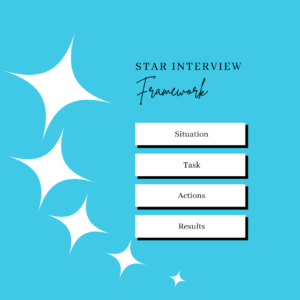
How To Answer Behavioural Questions in a Job Interview Using the STAR Framework
Congratulations, you have booked a job interview and now you are prepping to ensure you come across as the top job candidate for the position. It is one thing to search for lists of job interview questions that you might be asked, but you will be well ahead of the curve if you can learn how to answer ANY question. More specifically, any behavioural job interview question that you might be asked. So don’t waste your time memorizing “good answers to job interview questions”. Instead, learn what employers want to hear. Learn how to answer behavioural questions in a job interview using the STAR framework.
In this blog post, I will review for you what behaviour-based job interview questions look like, what employers are looking for in a “good answer”, and how candidates that answer questions using the STAR framework come out shining …like a STAR.
But before we get into the details about the STAR framework, I wanted to point you to some other great blog posts that will help you prepare for a job interview:
- Ace Your Next Job Interview by Mastering Interview Methods Being Used by Hiring Managers and Recruiters
- 5 Things You Need to Do Before A Video Call Job Interview
- 10 Tips for a Successful Job Interview
- The Best Questions to Ask At the End of a Job Interview
Now, let’s get started learning more about behavioural job interview questions and how to answer them!
What is a Behavioural Job Interview Question?
First off, let’s look at exactly what behaviour-based job interview questions are and their purpose. Behavioral-based interviewing is a popular interviewing method used by recruiters and hiring managers. The theory behind this technique states that the best predictor of someone’s future behaviors is their previous behaviour. So… how you have responded to and solved situations in the past, and what you learned from those experiences, is a good indication of how you will perform in the future. Behavioural questions are posed to job candidates asking them to draw from their previous experiences and provide examples.
Can you tell me about a time when…?
Describe a situation where…
Can you give me an example of when…?
What Types of Behavioural Job Interview Questions Will Be Asked in a Job Interview?
Alright, raise your hand if your job interview prep work includes Googling lists of job interview questions that might get thrown at you! I’m guilty of this too! Before working in Human Resources and knowing how large companies and professional recruiters design their interview questions…I did this!
But, there is a method to the questions they ask! Recruiters and hiring managers ask questions based on the competencies required to perform the job they are recruiting for successfully.
Now you might be saying, what are the competencies?
The competencies employers are looking for can usually be found within the job description (the job posting) or company profile.
Someone who …
- Is a problem solver
- Has developed leadership skills
- Takes initiative
- Is customer-focused
- Can manage competing priorities
- Is adaptable
You get the idea!
View this post on Instagram
How To Answer Behavioural Job Interview Questions
Answering behavioural job interview questions can seem tricky to begin with. You might be asking yourself, what is the “right answer”. What is the interviewer looking for in a perfect response? Although I cannot tell you exactly how to respond to each question you might ever be asked in a job interview, I can teach you how to answer them using the STAR framework.
Once you understand what a response to a behavioural job interview SHOULD be, you will stand out from the rest of the job candidates. By following the STAR method in your responses, your answers will be structured, and you will be able to demonstrate that you can communicate clearly and concisely.
Stick with me and you’re going to ace this interview! You’ve got this!
What is the STAR framework for answering job interview questions?
 Recruiters and hiring managers are taught to use the STAR “interview method” to evaluate a job seeker’s response to behaviour-based interview questions. The STAR method expects candidates to respond to the questions by describing a specific situation, tasks they completed, actions they have taken, and the results that have come about. By knowing what interviews expect to hear in a “good” response to their question, you’ll be able to answer any question that gets thrown at you in a job interview.
Recruiters and hiring managers are taught to use the STAR “interview method” to evaluate a job seeker’s response to behaviour-based interview questions. The STAR method expects candidates to respond to the questions by describing a specific situation, tasks they completed, actions they have taken, and the results that have come about. By knowing what interviews expect to hear in a “good” response to their question, you’ll be able to answer any question that gets thrown at you in a job interview.
Let’s break this down a little further.
1. Start by describing the SITUATION.
When answering a behaviour-based job interview question, start by explaining the situation. Set the scene and provide a specific example drawn from your experience that is directly related to the question asked.
I repeat, a specific example. These questions require examples that demonstrate your experience and competencies. You should not respond to these questions with “if I was in this situation, I would”. To learn more about situation-based job interview questions and behavioural job interview questions look at this post.
2. Identify the TASKS required for the given situation.
In your response, identify the tasks that needed to be performed. Explain what needed to be done and what YOUR responsibility was. Avoid using “we” if you worked collaboratively. Clearly identify YOUR tasks.
3. Explain your ACTIONS.
Use this as an opportunity to explain exactly what YOU did. Provide the interviewer with the specific steps that you took and why you took those steps.
4. Deliver the RESULTS.
Describe the outcome achieved from your actions. What were the measurable results? Explain and provide details. If you feel you learned something or looking back would do something differently– explain this to the interviewer and provide your reasoning.
By using this framework and applying it to all behaviour-based job interview questions that you are confronted with…. you will outshine other job candidates!
The questions you are being asked are a test. A test to see if you:
- understand the question being asked;
- can prove you have the experience they are looking for by providing concrete examples; and
- can effectively communicate a situation, what you did, why you did it, and the results.
The best piece of interview advice I can give you is to not Google the best answers to job interview questions and try to memorize them. You will come across as unauthentic and robotic. Understand the STAR framework and deliver your own answers pulling from YOUR experience.
Best of luck in your next job interview!




